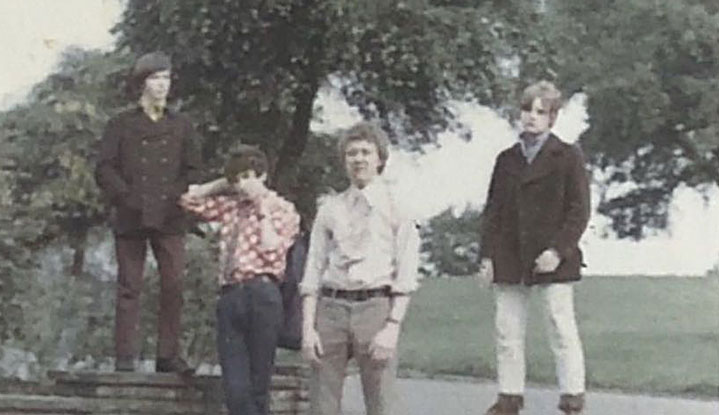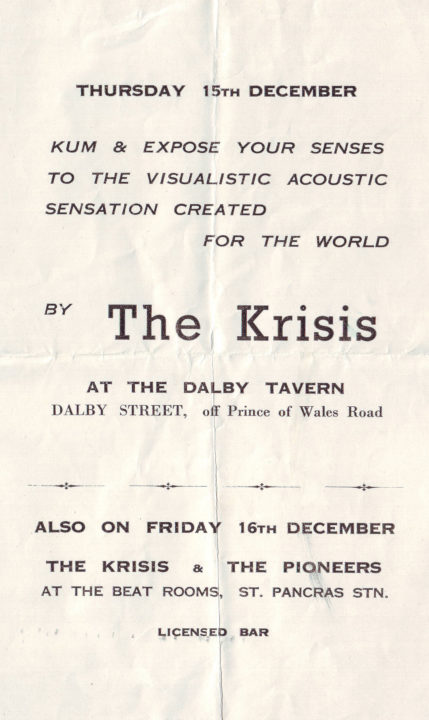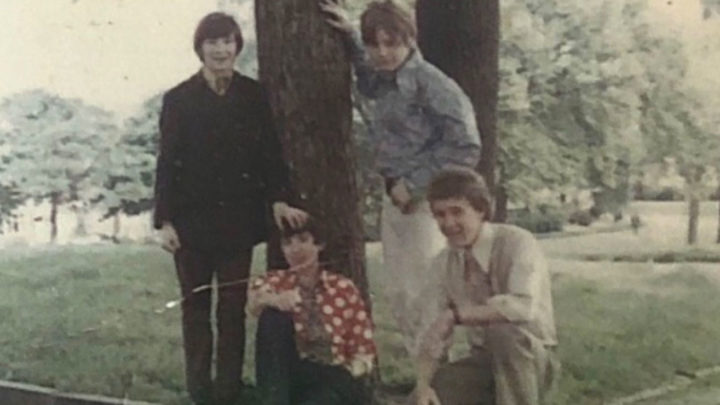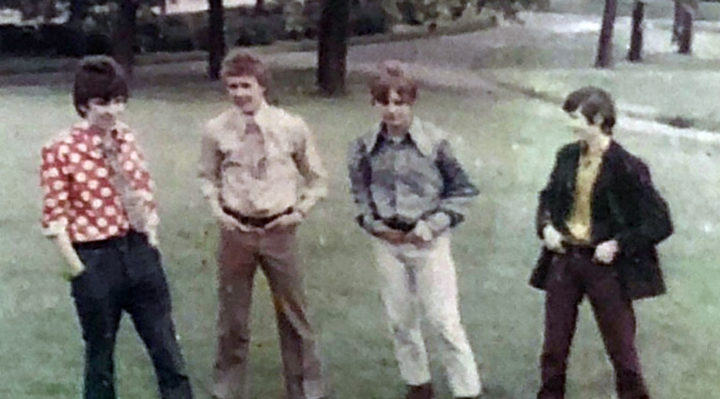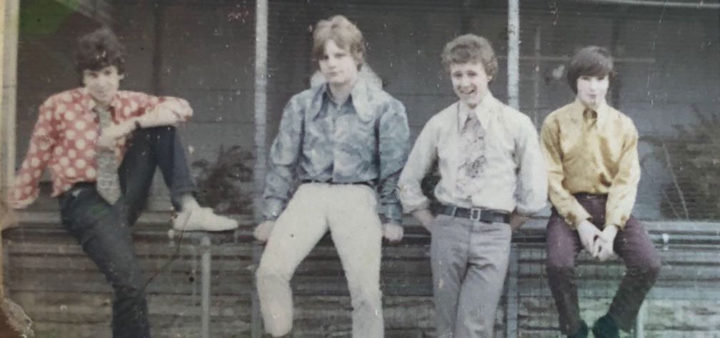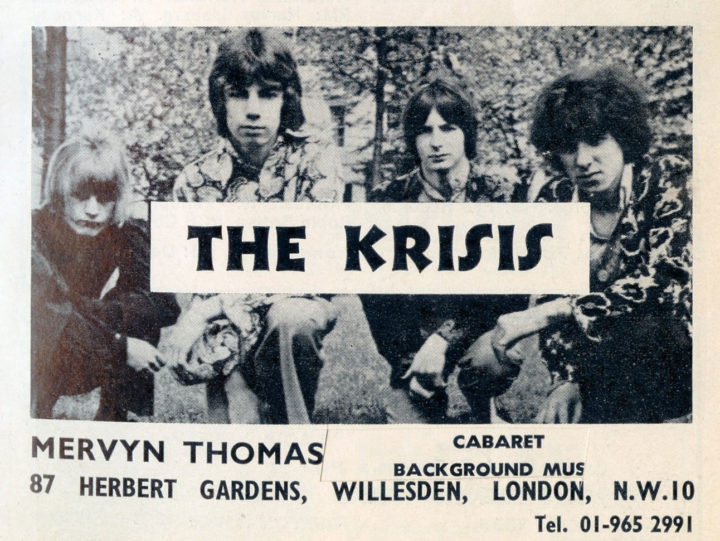
Originally published November, 2010, revised June 2012
From Ealing in West London, R&B band Frankie Reid & The Casuals were notable for containing several musicians that went on to fame and fortune in later years.
Frankie Reid & The Casuals #1 (Late 1960)
Frankie Reid – vocals
Mick Cosgrave – lead guitar (replaced before first gig)
John Donald – rhythm guitar
Danny McCulloch – bass
Mick Revelle – drums (replaced by Peter Stretch early on)
Born in Ceylon (now Sri Lanka), Frankie Reid and his brother Ralph started performing in 1957 as the Reid Brothers. In February 1960, they moved to London and in their first week in the capital entered and won a talent contest, held at the Shepherd’s Bush Hotel.
In September, Frankie Reid was introduced to the manager of the Kew Boathouse in Kew, Middlesex, who hired him to sing at the club with the three resident bands – Cliff Bennett & The Rebel Rousers, Pat Creswell & The Crescents and Ray & The Riversiders. Signed up for six months, he performed six songs a night, split between each band.
Turning down an offer to play another six months at the Kew Boathouse, Reid chose instead to form his own group. Hearing about The Casuals who needed a new singer after Tony Craven had left; Reid met the musicians – John Donald, Mick Cosgrave, Danny McCullough and Mick Revelle – at a rehearsal hall in Askew Road, Shepherd’s Bush.
Originally known as The Avro Boys, who had won a talent contest at the Gaumont in Shepherd’s Bush, the group appeared in a BBC documentary on how the guitar had taken over from the piano in the home. Produced by Ken Russell, “Guitar Craze – From Spain to Streatham” was screened on BBC TV’s “Monitor”, presented by Huw Weldon. Soon afterwards, the group linked up with singer Tony Craven and became Tony Craven & The Casuals.
Not long after Frankie Reid had joined forces with The Casuals, the band took on Bill Dunton as their manager. Dunton sold his Ford Zodiac/Zephyr to buy a van, which was painted with the band’s name and the individual group members’ names on the side.
Despite rehearsing about 60 songs, Mick Cosgrave left before a single gig and Roger Black (aka Bluck) took over on lead guitar. Soon after, Peter Stretch came in for Mick Revelle.
Frankie Reid & The Casuals #2 (Late 1960-late 1961)
Frankie Reid – vocals
Roger Bluck – lead guitar
John Donald – rhythm guitar
Danny McCulloch – bass
Peter Stretch – drums
One of the group’s earliest gigs was at the Pitshanger Lane Youth Club. The second line up also played at Battersea Town Hall and was regulars at the Brixton Maccabi Jewish club, St Mary’s Hall in Putney, the White Hart in Southall, Middlesex and the Clay Pigeon in Eastcote, Middlesex.
Sometime in late 1961, Peter Stretch left and a very young Mitch Mitchell took over. Originally from Ealing, Mitchell had taken drum lessons at Jim Marshall’s shop and was recommended to Reid by Marshall. Mitchell had briefly worked with The Crescents before joining The Casuals.
Frankie Reid & The Casuals #3 (Late 1961-spring 1962)
Frankie Reid – vocals
Roger Bluck – lead guitar
John Donald – rhythm guitar
Danny McCulloch – bass
Mitch Mitchell – drums
In early 1962, Roger Bluck, who worked at EMI as a record cover designer, got the opportunity to do some session work backing a pianist on an instrumental single and called the other Casuals to see if they could participate. Unfortunately, only Donald could make it and subsequently the session was cancelled.
A few months later both Donald and Bluck departed. While Donald would join Brian Connell & The Countdowns for about six months in 1963, Bluck would go on to become a member of David Bowie’s early group Davey Jones & The King Bees in November 1963. From there, he went on to play with The Spectrum from 1964-1968. Ian Holland came in on lead guitar and the band continued as a four-piece.
 Frankie Reid & The Casuals #4 (spring 1962)
Frankie Reid & The Casuals #4 (spring 1962)
Frankie Reid – vocals
Ian Holland – lead guitar
Danny McCulloch – bass
Mitch Mitchell – drums
The new line up played gigs at St Mary’s Hall, Putney, the Ealing Club, Acton Town Hall, Ealing Town Hall, Wembley Town Hall, the White Hart in Southall, Middlesex and Southall Community Centre.
Frankie Reid & The Casuals #5 (May-circa July 1962)
Frankie Reid – vocals
Ian Holland – lead guitar
Brian Mansell – rhythm guitar
Danny McCulloch – bass
Mitch Mitchell – drums
Brian Mansell, a rhythm guitarist from Whitton, Middlesex had been playing with Mike Dee & The Jaywalkers, who changed name to The Condors in April 1962 for one tour. When the band’s guitarist Ritchie Blackmore left to join Screaming Lord Sutch & The Savages, The Condors split and Mansell got a job with Frankie Reid & The Casuals. Soon after he joined, Mansell lobbied for his former band mate, Terry Mabey, to take over from Mitch Mitchell.
Mitchell was given his marching orders and joined Peter Nelson & The Travellers with lead singer Pete Nelson, bass player Tony Ross, rhythm guitarist Tony Hall and lead guitarist Vic Briggs (who years later joined Eric Burdon & The New Animals). In subsequent years, Mitchell played with Johnny Harris & The Shades, The Soul Messengers, The Next 5, The Riot Squad and Georgie Fame & The Blue Flames before ultimately finding fame and fortune with The Jimi Hendrix Experience in September 1966.
Notable gigs:
26 May 1962 – White Hart, Southall, Middlesex
27 May 1962 – Clay Pigeon, Eastcote, Middlesex
31 May 1962 – Gifford School, Northolt, Middlesex
2 June 1962 – St Mary’s Hall, Putney, Surrey
9 June 1962 – White Hart, Southall, Middlesex
11 June 1962 – Boathouse, Kew, Surrey
14 June 1962 – Hatfield College (Hatfield, Hertfordshire?)
15 June 1962 – Poplar Town Hall, Poplar, London
16 June 1962 – St Mary’s Hall, Putney, Surrey
17 June 1962 – Invicta Ballroom, Chatham, Kent
18 June 1962 – Howard Hall, Ponders End, Enfield
22 June 1962 – Poplar Town Hall, Poplar, London
23 June 1962 – White Hart, Southall, Middlesex
25 June 1962 – Clay Pigeon, Eastcote, Middlesex
26 June 1962 – Roxeth School, South Harrow, Middlesex
29 June 1962 – Wimbledon Palais, Wimbledon
30 June 1962 – St Mary’s Hall, Putney, Surrey
2 July 1962 – Clay Pigeon, Eastcote, Middlesex
6 July 1962 – White Hart, Southall, Middlesex
7 July 1962 – Atheneon, Muswell Hill, London
8 July 1962 – Irish club, Cricklewood, Middlesex
13 July 1962 – Woking (Atlanta Ballroom?), Surrey
14 July 1962 – Royal Oak, Dagenham, Essex
Frankie Reid & The Casuals #6 (Circa July-September 1962)
Frankie Reid – vocals
Ian Holland – lead guitar
Brian Mansell – rhythm guitar
Danny McCulloch – bass
Terry Mabey – drums
Having only joined the band a few months earlier, Brian Mansell handed in his notice at the end of September and dropped out of the music scene for several years, returning in 1966 with Sunbury, Middlesex band, The Missing Links.
The following year, he joined The All Night Workers and stuck with this group until 1969.
When Mabey wasn’t well enough to perform, Derek Sirmon, who had attended Kneller school in Twickenham, Middlesex with Brian Mansell and Terry Mabey, filled in on drums.
Notable gigs:
19 July 1962 – Hatfield College, (Hatfield, Hertfordshire?)
20 July 1962 – Hendon, Middlesex
21 July 1962 – Stanwell, Middlesex (afternoon)
21 July 1962 – Atheneon, Muswell Hill (afternoon)
22 July 1962 – Irish club, Cricklewood, Middlesex
24 July 1962 – Park Ballroom, Southampton, Hants
25 July 1962 – Hillingdon, Middlesex
27 July 1962 – Crayford Town Hall, Crayford, Kent
28 July 1962 – Tiptree, Essex
29 July 1962 – Invicta Ballroom, Chatham, Kent
1 August 1962 – Hillingdon, Middlesex
3 August 1962 – Hendon, Middlesex
4 August 1962 – Botwell Club, Hayes, Middlesex
9 August 1962 – Hatfield (Hatfield, Hertfordshire?)
10 August 1962 – Woking (Atlanta Ballroom?), Surrey
11 August 1962 – St Mary’s Hall, Putney, Surrey
15 August 1962 – Hillingdon, Middlesex
17 August 1962 – Winchester, Hants
18 August 1962 – St Mary’s Ballroom, Putney, Surrey
19 August 1962 – Southall Community Centre, Southall, Middlesex
22 August 1962 – Clay Pigeon, Eastcote, Middlesex
24 August 1962 – White Hart, Southall, Middlesex
25 August 1962 – White Hart, Southall, Middlesex
31 August 1962 – Park Ballroom, Middlesex
1 September 1962 – Botwell Club, Hayes, Middlesex
5 September 1962 – Hillingdon, Middlesex
7 September 1962 – Finchley, Middlesex
9 September 1962 – Carlton Ballroom, Slough, Berkshire
14 September 1962 – Dormers Pioneer Club, Southall, Middlesex
15 September 1962 – St Mary’s Ballroom, Putney, Surrey
16 September 1962 – Invicta Ballroom, Chatham, Kent
22 September 1962 – White Hart, Southall, Middlesex
28 September 1962 – Crayford Town Hall, Crayford, Kent
Frankie Reid & The Casuals #7 (October 1962)
Frankie Reid – vocals
Ian Holland – lead guitar
Danny McCulloch – bass
Terry Mabey or Derek Sirmon – drums
Reduced to a four-piece, this was another short-lived line up of Frankie Reid & The Casuals.
In October 1962, Derek Sirmon and Danny McCulloch left to join Screaming Lord Sutch & The Savages.
Frankie Reid & The Casuals #8 (October 1962-circa February 1963)
Frankie Reid – vocals
Ian Holland – lead guitar
Steve Hargreaves – bass
Terry Mabey – drums (replaced by Bill Dunton)
This was yet another short-lived line up of the band. In early 1963, Terry Mabey left to join Ealing band, James Royal & The Hawks.
Bill Dunton took over the drums for a while but didn’t stay long.
Notable gigs:
21 January 1963 – White Hart, Southall, Middlesex (the band plays every Monday)
28 January 1963 – White Hart, Southall, Middlesex (the band plays every Monday)

2-3 February 1963 – Plaza, Guildford, Surrey (Surrey Advertiser)

Frankie Reid & The Casuals #9 (Circa February-April 1963)
Frankie Reid – vocals
Ian Holland – lead guitar
Chris Jackson – rhythm guitar
Steve Hargreaves – bass
John Kerrison – drums
John Kerrison attended Mellow Lane in Hayes in Middlesex where Keith Grant of The Downliners Sect also went to school.
At the age of 14, Kerrison played with The Cossacks from Greenford, Middlesex. The group’s line up also included Keith Lewis (lead guitar/vocals) and Merv Lewis (bass).
From there, he hooked up with Paul & The Alpines, featuring Paul Lonergan (vocals); Ray Kirkham (lead guitar); Dave Dove (bass) and Alf Fripp (rhythm guitar).
Managed by Sid Foreman, the band worked quite a bit for the Roy Tempest Agency. It was while he was drumming with this band that Kerrison got the call to audition for Frankie Reid & The Casuals at the Viaduct Pub in Hanwell, Middlesex after Bill Dunton left.
Soon after he joined, the band reverted to a five-piece by adding Chris Jackson on rhythm guitar.
Ian Holland and Steve Hargreaves both left in spring 1963, although Hargreaves would re-join Frankie Reid in later years in his group, The Powerhouse.
Ian Holland (sometimes known as Hollands) went to record with The Legends and also played with The Magic Roundabout.
Notable gigs:

25 March 1963 – King George’s Hall, Esher, Surrey

Frankie Reid & The Casuals #10 (Circa April 1963-December 1964)
Frankie Reid – vocals
Mick Liber – lead guitar
Reg Bodman – bass
Chris Jackson – rhythm guitar
John Kerrison – drums
Scots-born lead guitarist Mick Liber’s first notable band was Ealing group Clay Alison & The Searchers led by guitarist and future lawyer, Andre de Moller.
Liber was also friends with Pete Townshend, who had rented a flat off Liber’s dad in Sunnyside Road in Ealing during his time at Ealing Art College, and taught Liber how to play feedback.
Originally from Peckham in south London, Reg Bodman had started out in 1960 with local band, The Talismen, which included drummer Al Alison from Emile Ford & The Checkmates for a while.
When Frankie Reid & The Casuals broke up in the December 1964, John Kerrison joined The Rocking Eccentrics and then went on to work with The Horizons, The Dae-b-Four, The New Pirates, Episode Six and The Beachcombers.
Reg Bodman filled in for a number of bands around the Ealing area, including The Ealing Redcaps, The Pirates and Morgan James before joining a soul band in Southeast London called The Sassenachs, who played top Soho clubs like the Flamingo and the Marquee.
After playing with this band for over ten years, Bodman relocated to Kent and worked with the blues band TwoSixNine. He then went on to work with a soul band in Dorset (where he currently lives) called Soul Intention.
Mick Liber had guested with Ealing group, The Unit 4 led by his friend Frank Kennington from mid-1964.
The pair reunited in Sydney, Australia in January 1965 and formed a new (Australian) version of Unit 4 (see pic below).

They also worked together in The Denvermen before forming the original Python Lee Jackson in Sydney, Australia in December 1965.
Liber returned to the UK with a new version of Python Lee Jackson in October 1968 and subsequently reunited with Frankie Reid (see below).
Frankie Reid dropped out of the music scene briefly before returning in 1968 with a new band, The Powerhouse, which he led until 1974.

Notable gigs:
23 May 1963 – Ealing Club, Ealing, Middlesex (Thursday)
13 June 1963 – Ealing Club, Ealing, Middlesex with Jimmy Royal & The Hawks (Thursday)
20 June 1963 – Ealing Club, Ealing, Middlesex with Jimmy Royal & The Hawks (Thursday)
30 July 1963 – Top Twenty Nite Club, Swindon, Wiltshire
2 February 1964 – Ealing Club, Ealing, Middlesex (Harrow Observer & Gazette) (Sunday)
9 February 1964 – Ealing Club, Ealing, Middlesex (Sunday)

11 April 1964 – Rock Stars, Adeyfield Hall, Hemel Hempstead, Herts with Sounds Five (Hertfordshire and Hemel Hempstead Gazette and West Herts Advertiser)
20 April 1964 – Ealing Club, Ealing, Middlesex (Monday) (Billed as The Casuals)
27 April 1964 – Ealing Club, Ealing, Middlesex (Monday) (Billed as The Casuals)
18 June 1964 – Ealing Club, Ealing, Middlesex (Thursday)
25 June 1964 – Ealing Club, Ealing, Middlesex (Thursday)

30 June 1964 – Jolly Gardeners, Isleworth, Middlesex with Mark Leemen Five (billed Frankie Reed & The Casuals)
2 July 1964 – Ealing Club, Ealing, Middlesex (Thursday)
9 July 1964 – Ealing Club, Ealing, Middlesex (Thursday)
16 July 1964 – Ealing Club, Ealing, Middlesex (Thursday)
23 July 1964 – Ealing Club, Ealing, Middlesex (Thursday)

25 July 1964 – “The Cavern” at the West Cliff Hall (near Ramsgate), Kent with The Satans
30 July 1964 – Ealing Club, Ealing, Middlesex (Thursday)
10 September 1964 – Ealing Club, Ealing, Middlesex (Harrow Observer & Gazette) (Thursday)
17 September 1964 – Ealing Club, Ealing, Middlesex (Thursday) (special guest Jimmy Royal)

24 September 1964 – Ealing Club, Ealing, Middlesex with Jimmy Royal & The Hawks (Thursday)
25 September 1964 – Lynx Club, Borehamwood, Herts with The Fenmen (Simon Gee research – see comments section below)
26 November 1964 – Ealing Town Hall, Ealing, Middlesex with The Second Thoughts

28 November 1964 – Dreamland Ballroom, Margate, Kent with The Applejacks

29 November 1964 – Rocky Rivers Top 20 Club, Conservative Club, Bedford


Frankie Reid & The Powerhouse (1968-1969)
Frankie Reid – lead vocals
Mick Liber – lead guitar
Steve Hargreaves – bass
Peter Abbot – drums
Frankie Reid returned to the West London live scene with The Powerhouse, featuring former Casuals bass player Steve Hargreaves.
After arriving back in England from Australia in late 1968, Liber reunited with his old band leader.
In 1969, the latest version of Python Lee Jackson, which included drummer David Montgomery, recorded the classic “In A Broken Dream” with Rod Stewart.
In 1970, Liber introduced Montgomery, keyboard player David Bentley and former Easybeats drummer Tony Cahill, who was now playing bass, all current members of the UK-based Python Lee Jackson, to the latest line up of Frankie Reid’s Powerhouse. The second incarnation recorded some material that remains unreleased.


Frankie Reid & The Powerhouse (1970)
Frankie Reid – lead vocals
Mick Liber – lead guitar
David Bentley – organ
Tony Cahill – bass
David Montgomery – drums
(Early-mid 1970s)
John Hawken – piano
Neil Korner – bass
While working with The Powerhouse, Liber also toured and recorded with Ashton, Gardner & Dyke. Together with Bentley, Cahill and Montgomery, he continued to record with Python Lee Jackson, and later did studio work with Third World War and live work with Thunderclap Newman. In 1973, Liber returned to Australia and continued to perform with a number of artists, most notably Dana Gillespie and Blerta.
After The Powerhouse split up in 1974, Frankie Reid formed The Frankie Reid Band. In 1978, he formed Flying Fox with drum legend Carlo Little and bass player Nick Simper, best known for being an original member of Deep Purple. In November 1979, however, he emigrated to Australia and currently lives in Perth.
Many people helped piece this story together. Thanks to Frankie Reid, particularly for the use of photos/images.
Thanks to Brian Mansell for the list of concert dates from May-September 1962, which were taken from his diary.
I’d also like to credit John Kerrison, Mick Liber, John Donald, Colin Reece, Nick Simper, Reg Bodman and Terry Mabey for their invaluable input.
Concert dates were also taken from several newspapers, including the Ampthill News & Weekly Record, East Kent Times & Mail, Harrow Observer, Middlesex County Times & West Middlesex Gazette, the Middlesex Chronicle (Hounslow Edition), Surrey Comet and Swindon Evening Advertiser.
Copyright © Nick Warburton. All Rights Reserved. No part of this article may be reproduced or transmitted in any form or by any means, without prior permission from the author.
I have tried to ensure the accuracy of this article but I appreciate that there are likely to be errors and omissions. I would appreciate any feedback from anyone who can provide any additions or corrections.
Email: Warchive@aol.com



















































































 The Krisis were a mystery when Jean-Pierre Coumans sent in a photo of them, adding “the back of the photo has a stamp of a Dutch promotion bureau with tel. number + a foreign tel. number with at the end handwritten: UK. So an English band but from where? Wonder if these guys released anything on vinyl?”
The Krisis were a mystery when Jean-Pierre Coumans sent in a photo of them, adding “the back of the photo has a stamp of a Dutch promotion bureau with tel. number + a foreign tel. number with at the end handwritten: UK. So an English band but from where? Wonder if these guys released anything on vinyl?”